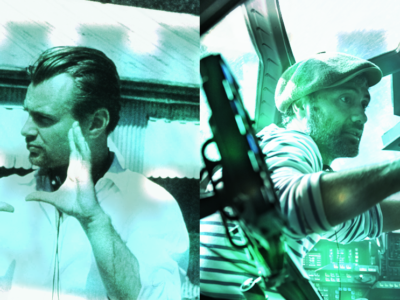How (and Why) you really should still watch TENET (2020)
 This article may seem late to some of you. But, since the film barely made a profit at the box office, and its digital release made few waves, I think it’s safe to assume that most folks have yet to experience Nolan’s latest offering. As you’ll find out, I very much recommend viewing this movie at home, with subtitles primed and entertainment system cranked.
This article may seem late to some of you. But, since the film barely made a profit at the box office, and its digital release made few waves, I think it’s safe to assume that most folks have yet to experience Nolan’s latest offering. As you’ll find out, I very much recommend viewing this movie at home, with subtitles primed and entertainment system cranked.
What can be said about Tenet? A lot, probably, given the climate of media that we have been forced into thanks to a pandemic, and because the film itself, even when divorced from its present surroundings, is significantly complex and compelling.
It’s probably a movie that was as hard to create as it is to fully grasp and appreciate. I’ll be upfront with you; I have always been a loyal Chris Nolan fan, yet I understand that his brand of storytelling is not for everyone. His methods are unorthodox at best and downright perplexing and heavily convoluted at worst. It’s my view that Tenet rides the line between compelling and confusing.
But it does so with style.
Big style.
Like any big budget Nolan flick, it’s loaded with clever dialogue, bombastic (and mostly CGI-free) action sequences and set pieces, and cutting edge plot elements. That’s why I enjoyed my first viewing of Tenet, but it’s not why I wanted to see it again. The primary reason I wanted to watch it again was so I could put on subtitles, turn up the volume, and smash pause when perplexed at the nuances of a scene.
 It’s not that it’s a difficult movie to watch or keep up with. It’s very straightforward in its plot points for about the first 2 acts of the film, and the action is edge-of-your-seat intense and great fun. The issues arise when the dialogue (often delivered in either hushed undertones or through breathing apparatus) which is (hopefully?) meant to explain some plot points only serves to obfuscate the story. This novel idea of “inversion” is complicated, so “don’t try to understand it. Feel it,” as one unnamed scientist explains. I think that’s quite a meta comment; if you try really hard to understand every element of the plot, and every bit of mechanics surrounding time inversion along with it, you’ll spend about 150 minutes in mild frustration. (I was going to make some joke about inverting time to get your 150 minutes back, but upon further reflection, that seems harsh).
It’s not that it’s a difficult movie to watch or keep up with. It’s very straightforward in its plot points for about the first 2 acts of the film, and the action is edge-of-your-seat intense and great fun. The issues arise when the dialogue (often delivered in either hushed undertones or through breathing apparatus) which is (hopefully?) meant to explain some plot points only serves to obfuscate the story. This novel idea of “inversion” is complicated, so “don’t try to understand it. Feel it,” as one unnamed scientist explains. I think that’s quite a meta comment; if you try really hard to understand every element of the plot, and every bit of mechanics surrounding time inversion along with it, you’ll spend about 150 minutes in mild frustration. (I was going to make some joke about inverting time to get your 150 minutes back, but upon further reflection, that seems harsh).
My sentiments are not very different from the scientist’s. I say when you watch this movie you shouldn’t expect Inception, an emotionally complex story with its near flawless buildup to a shocking (and still widely debated) ending. You should expect a fun and engaging Hollywood experience with big explosions, big musical impacts (Hans Zimmer wasn’t involved with the music, but they had me fooled), and amazing globetrotting backdrops. Tenet will certainly not go down as Nolan’s finest work on the big screen, but for me, that’s ok. It’s fun enough, and thought provoking enough, to be a true and solid Nolan effort worthy of your attention.
I don’t think it will be endlessly picked apart and debated (à la Inception) or considered a genre defining action film (like The Dark Knight). But since its repeated delays and defiant release into a historically desolate box office season, it’s been weighed down with expectations of grandeur and splendor. Tenet was expected to be the movie that “brings America back to the cinema—” obviously it didn’t quite pan out that way, but it’s worth seeing more than once (in a theater, if you can).
 It makes you consider some of the themes presented in a deep way once you leave the cinema, like most Nolan movies tend to do, and therefore has me wanting more. The cast is solid and the cinematography is pretty much flawless, with just the right amount of fake accents and overdressed millionaires to make you really enjoy the spectacle of the Bond-esqe action sequences and quippy one liners; and Pattinson, for all the grief he endures, is perfectly cast as the witty sidekick.
It makes you consider some of the themes presented in a deep way once you leave the cinema, like most Nolan movies tend to do, and therefore has me wanting more. The cast is solid and the cinematography is pretty much flawless, with just the right amount of fake accents and overdressed millionaires to make you really enjoy the spectacle of the Bond-esqe action sequences and quippy one liners; and Pattinson, for all the grief he endures, is perfectly cast as the witty sidekick.
The main issue I had was not that the cast and locales were generally just backdrops for the time bending mechanisms. The main issue wasn’t the muddy sound mixing that made words hard to distinguish on top of an ear busting soundtrack. The main issue I had was a lack of the emotional weight that compels any great story.
 Our protagonist (who is nameless and literally credited as “Protagonist”) is compelled by curiosity (I guess?) and some vague sense of heroic duty to try and save the world, but little else. Protagonist’s somewhat flat love interest is compelled as well since she’s got a son in this dangerous world who she wants to save, though you never really meet him. It’s a film full of people compelled to do things for the plot because that’s what they are supposed to do; our arms dealing villain is for some reason working for the unseen malevolent future bad guys as an agent of destruction. Those future enemies and their motivations are literally dismissed on screen. You aren’t really told why things are happening, just how and to what end (and even that only sometimes). There’s no solid “emotional core” that compels our players on the stage, and we are therefore not deeply invested in what happens.
Our protagonist (who is nameless and literally credited as “Protagonist”) is compelled by curiosity (I guess?) and some vague sense of heroic duty to try and save the world, but little else. Protagonist’s somewhat flat love interest is compelled as well since she’s got a son in this dangerous world who she wants to save, though you never really meet him. It’s a film full of people compelled to do things for the plot because that’s what they are supposed to do; our arms dealing villain is for some reason working for the unseen malevolent future bad guys as an agent of destruction. Those future enemies and their motivations are literally dismissed on screen. You aren’t really told why things are happening, just how and to what end (and even that only sometimes). There’s no solid “emotional core” that compels our players on the stage, and we are therefore not deeply invested in what happens.
It’s quite a contrast to Inception, a Nolan film with an emotional catalyst. That movie clearly presents the relationships that compel our hero to take extreme risks in order to get what he so painfully desires. Tenet seems to be devoid of any similarly powerful character motivations. Maybe there simply wasn’t room for that in the complex and nearly all-consuming plot mechanics surrounding time bending shenanigans. Maybe it’s just hard to make a great film without Leo. Who knows.
All of that said, Tenet is distinct enough from other big summer blockbusters that it deserves attention. It’s clearly more intelligent than your average action spy movie, despite not being an instant classic (even among the pantheon of Nolan works). Check out Tenet if you like big Hollywood action that makes you think.
There it is. Maybe I could have said that upfront and saved myself a few hundred words?







